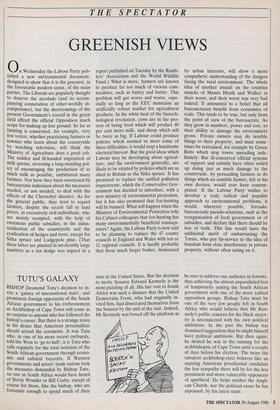THE SPECTATOR
GREENISH VIEWS
0 n Wednesday the Labour Party pub- lished a new environmental document, designed to show that it is the greenest, in the favourable modern sense, of the main parties. The Liberals are popularly thought to deserve the accolade (and its accom- panying connotation of other-worldly in- competence), but the shortcomings of the present Government's record in the green field afford the official Opposition much scope for making up lost ground. So far as farming is concerned, for example, very few voters, whether practicising farmers or townies who learn about the countryside by watching television, will think the Ministry of Agriculture does a good job. The sudden and ill-handed imposition of milk quotas, reversing a long-standing pol- icy of encouraging the production of as much milk as possible, embittered many farmers. Nor have they been sweetened by bureaucratic indecision about the measures needed, or not needed, to deal with the effects of the Chernobyl disaster. As for the general public, they tend to regard farmers, despite the recent fall in land prices, as excessively rich individuals, who are mainly occupied, with the help of enormous public subsidies, in the indus- trialisation of the countryside and the eradication of hedges and trees, except for Sitka spruce and Lodgepole pine. (That these latter are planted in intolerably large numbers as a tax dodge was argued in a
report published on Tuesday by the Ramb- lers' Association and the World Wildlife Fund.) What is more, farmers are known to produce far too much of various com- modities, such as barley and butter. This problem will get worse and worse, espe- cially so long as the EEC maintains an artificially robust market for agricultural products. In the white heat of the biotech- nological revolution, cows are in the pro- cess of being bred which will product 40 per cent more milk, and sheep which will be twice as big. If Labour could produce policies which seemed to meet some of these difficulties, it would reap a handsome electoral harvest. But the good ideas which Labour may be developing about agricul- ture, and the environment generally, are likely to be vitiated by policies which are as alien to Britain as the Sitka spruce. It has promised to replace the unified pollution inspectorate, which the Conservative Gov- ernment has decided to introduce, with a new ministry of environmental protection, but it has also promised that fox-hunting will be banned. What will happen when the Minister of Environmental Protection tells his Cabinet colleagues that fox-hunting has many environmentally beneficial consequ- ences? Again, the Labour Party is now said to be planning to replace the 47 county councils in England and Wales with ten or 12 regional councils. It is hardly probable that these much larger bodies, dominated by urban interests, will show a more sympathetic understanding of the dangers facing the rural environment. The whole idea of another assault on the counties smacks of Messrs Heath and Walker at their worst, and their worst was very bad indeed. It amounted to a belief that all bureaucracies benefit from economies of scale. This tends to be true, but only from the point of view of the bureaucrats. As they grow in numbers, power and cost, so their ability to damage the environment grows. Private owners may do terrible things to their property, and must some- times be restrained, for example by Green Belts which stop towns spreading inde- finitely. But ill-conceived official systems of support and subsidy have often ended up doing just as much damage to the countryside, by persuading farmers to do things which no sensible farmer, left to his own devices, would ever have contem- plated. If the Labour Party wishes to develop a truly radical and populist approach to environmental problems, it would, wherever possible, foresake bureaucratic pseudo-solutions, such as the reorganisation of local government or of subsidies, and declare that there should be less of both. This line would have the additional merit of embarrassing the Tories, who pay lip-service to the idea of freedom from state interference in private property, without often acting on it.








































 Previous page
Previous page